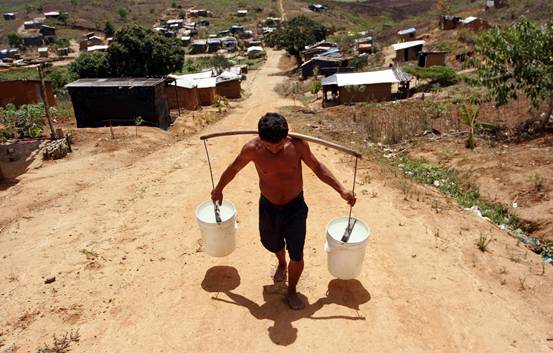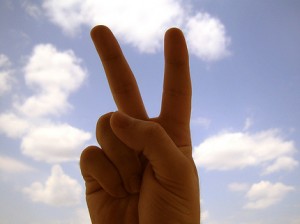Increasing global demand for energy will affect the already acute fresh water shortage, according to the latest United Nations World Water Development Report (WWDR) launched in Tokyo Saturday on the occasion of World Water Day.
The report highlighted a glaring lack of coordination between energy and water management [...]]]>
Increasing global demand for energy will affect the already acute fresh water shortage, according to the latest United Nations World Water Development Report (WWDR) launched in Tokyo Saturday on the occasion of World Water Day.
The report highlighted a glaring lack of coordination between energy and water management systems, despite the fact that places where people have inadequate access to water largely coincide with those where people have no electric power.

A man hauls water at the Chico Mendes landless peasant camp in Pernambuco, Brazil. Credit: Alejandro Arigón/IPS
More than 750 million people in the world have no access to clean water, and more than a billion people are not connected to an electric power grid.
Improving access to those vital resources means recognising the interdependence of water and energy for sustainable development, said Irina Bokova, director-general of the U.N. Educational, Scientific and Cultural Organisation (UNESCO).
Energy production accounts for roughly 15 percent of water withdrawal annually. By 2035, that number will rise to 20 percent due to population growth, urbanisation, and changing consumption patterns.
Similarly, declining water resources also have direct repercussions on the demand for electricity, which is expected to rise by 70 percent by 2035, mostly due to developments in India and China. Already those two countries are home to the largest number of people without access to water: 108 million in China and 99 million in India wake up every morning knowing it will be a life or death search for that precious resource.
Electric power plants, which produce 80 percent of the electricity worldwide, need large quantities of water for the cooling process. Water is also guzzled during energy production and for the extraction of fossil fuels. Likewise, the collection, transport and treatment of water consume massive quantities of energy.
Meeting the power challenges means creating systems that allow for the combined production and management of water and electricity, concludes the World Water Assessment Programme (WWAP), which produced the report.
The report also provides pricing solutions for the crisis, suggesting that the two resources be sold at rates that reflect more accurately their cost and environmental impact. Current water prices hardly reflect the true cost of provision, keeping in mind that it is an essential resource for all life on earth. Higher prices could encourage energy producers and users to value and save water, experts say.
Improving water and energy efficiency means embracing methods such as energy generation through water recycling. Such projects are already being implemented and are likely to spread in the future. In Chile, for example, the Farafana plant treats 50 percent of the wastewater of Santiago, producing alternative energy for 100,000 residents.
U.N. Secretary-General Ban Ki-moon said Friday that water and energy “interact with each other in ways that can help – or hinder – our efforts to build stable societies and lives of dignity for all.”
Anicée Gohar is a trainee at the IPS United Nations bureau.
]]>This begs the question: what exactly is it?
As my lead suggests, it’s not the first [...]]]>
 This week, as minds here in New York and elsewhere are inevitably drawn back to 9/11 and its aftermath, the U.N. General Assembly (GA) will once again discuss the worldwide promoting a Culture of Peace.
This week, as minds here in New York and elsewhere are inevitably drawn back to 9/11 and its aftermath, the U.N. General Assembly (GA) will once again discuss the worldwide promoting a Culture of Peace.
This begs the question: what exactly is it?
As my lead suggests, it’s not the first time the topic has passed our U.N. news desk.
Spearheaded by UNESCO, United Nations Educational, Scientific and Cultural Organization, 2000 became the U.N. Year for a Culture of Peace. For those who missed it, the GA doubled down on the concept a year later by declaring a Decade of the Culture of Peace (2001-2010) in which it took a stab at involving civil society in creating a global movement for peace culture.
75 million people signed a 2000 Manifesto pledging their support – Meanwhile, a quick survey among my friends revealed that, unfortunately, none knew of it.
“Peace is the absence of war” continues to be an evergreen. But how exactly do you create a culture in which war is absent? What is a Culture of Peace?
In a 1999 resolution and Programme of Action prepared by UNESCO, the GA agreed on eight elements of a Culture of Peace.
Here’s a little overview, drawn from the ’99 resolution and various works of David Adams, former Director of the UNESCO Unit for the Year of a Culture of Peace and an expert on the brain mechanism of aggression.
1. Education for Peace
Since warfare is a learned behaviour, according to Adams, a key component to building a Culture of Peace is a shift from an authoritarian and war-centric educational tradition to a participatory education on values and modes of behaviour that allow youth to resolve disputes non-violently and with respect for human dignity.
This education ought to take place not only in schools, but include informal education taking place through the family and the media, as well as non-governmental and community organizations.
2. Understanding, tolerance and solidarity
The act of “othering” people and designating an enemy is a key component to warfare and detrimental to a Culture of Peace.
Instead, the U.N. and social institutions at all levels ought to foster dialogue and actions that build mutual understanding, tolerance and solidarity.
3. Democratic participation
Hierarchical structures and authoritarianism that are at the centre of warfare ought to be replaced with people’s democratic involvement at all levels of decision-making affecting their lives.
In addition to stronger education on democratic principles, the resolution mentions capacity-building of public officials to strengthen institutions and processes that promote democracy.
4. Free flow of information and knowledge
A strong and free media is essential to documenting and promoting peace culture, while networks are essential social infrastructures.
Propaganda and secrecy, on the other hand, are essential to maintaining public approval for warfare. A free flow of information is thus essential to building a culture of peace in which an informed population is able to exercise its democratic rights to voice disapproval of acts of aggression.
5. Equality of women and men
Male domination is a central part of the culture of war, according to Adams, not because of a genetic disposition to warfare, but because of the age-old initiation of men into war and women’s systematic exclusion from it.
A transformation to a Culture of Peace therefore requires power sharing and the equal participation of women in decision-making.
6. Sustainable human development for all
Building secure livelihoods and the ability to lead healthy productive lives are key to building and maintaining peace.
Debt relief for developing countries, post-conflict reconciliation processes, and a special focus on the needs of women and children in developing strategies are listed as state-based contributions to a Culture of Peace.
7. Disarmament
While this may seem like a no-brainer, disarmament was actually among the last two items to be added to the action agenda, which originally only had six points.
It finally made it in under the header “Actions to promote international peace and security”, with complete disarmament as the top action item.
8. Respect for human rights
Respect for human rights as an essential component of peace culture encompasses many of the above points and should need little explanation.
Among the action items, the U.N. declaration sought the full implementation of the 1993 Vienna Declaration and the development national programmes and institutions to protect human rights.
]]>
Today reporter Matthew Lee asked questions beyond the official script during a press session with U.S. State Department spokeswoman, Victoria Nuland, following the Obama administration’s announcement that it would be cutting funding for the U.N. cultural agency, UNESCO, after its member countries overwhelmingly approved a Palestinian bid for full membership. Nuland said [...]]]>
Today reporter Matthew Lee asked questions beyond the official script during a press session with U.S. State Department spokeswoman, Victoria Nuland, following the Obama administration’s announcement that it would be cutting funding for the U.N. cultural agency, UNESCO, after its member countries overwhelmingly approved a Palestinian bid for full membership. Nuland said UNESCO’s decision was “regrettable, premature and undermines our shared goal to a comprehensive, just and lasting peace” between Israelis and Palestinians, adding that the U.S. would not be making it’s scheduled $60 million payment in November as a result. Over 100 countries voted for the bid or abstained and only 14 voted against it.
Following is an excerpt and here is Lee’s report in the Associated Press.
Victoria Nuland: …This was, as I said, regrettable, premature and undermines the prospect of getting where we want to go and that’s what we’re concerned about.
Matthew Lee: Exactly how does it undermine the process of getting where you want to go?
Victoria Nuland: The concern is that it creates tensions when all of us should be concerting our efforts to get the parties back to the table–
Matthew Lee: The only thing that it does is upset Israel and it triggers this law that you said will require you to stop funding UNESCO. Is there anything else? There’s nothing that changes on the ground, is there?
Victoria Nuland: Our concern is that this could exacerbate the environment which we’re trying to work through so that the parties can get back to the table–
Matthew Lee: How does it exacerbate the environment if it changes nothing on the ground, unlike, say, the construction of settlements. That changes nothing on the ground. It gives Palestine membership in UNESCO which is a body that the U.S. was so unconcerned about for many years that it wasn’t even a member.
Victoria Nuland: Well, I think you know that this administration is committed to UNESCO, rejoined UNESCO, wants to see UNESCO’s work go forward–
Matthew Lee: Well, actually the last administration joined UNESCO, not this one, but I need to have some kind of clarity on how this undermines the peace process other than the fact that it upsets Israel.
Victoria Nuland: Again, we are trying to get both of these parties back to the table, that’s what we’ve been doing all along, that was the basis for the president’s speech in May, basis of the diplomacy that the quartet did through the summer, the basis of the statement that the quartet came out with in September, so in that context we’ve been trying to improve the relationship between these two parties and improve the environment between them and we are concerned that we exacerbate tensions with this, and it makes it harder to get the parties back to the table.
Matthew Lee: Since the talks broke off last September until today, how many times have they met together, with all your effort?
Victoria Nuland: How many times have the parties met? I think you know the answer to that question, that doesn’t change the fact that we all are committed to trying–
Matthew Lee: Correct, so how can things get worse than they already are?
Victoria Nuland: Matt, I think you’re engaged in a polemic here rather than questions, Saeed please?
]]>